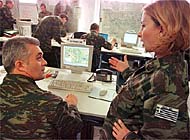The week in Switzerland

Switzerland's relations with its neighbours was very much to the fore this week, with "virtual" military exercises, carried on by computer rather than in muddy fields, capturing many headlines.
For the first time, Switzerland hosted a Nato exercise, under its Partnership for Peace (PfP) programme.
The defence minister, Adolf Ogi, made it clear at the outset that whereas Switzerland has been a member of the PfP for four years, there is no prospect of it compromising its neutrality by joining Nato.
More than 400 military experts from 19 countries took part in the week-long “virtual” manoeuvres near Lucerne, simulating a peacekeeping mission and other military scenarios from their desk-tops.
Swiss troops undertook their first military mission abroad in Bosnia-Herzegovina providing logistical support after the civil war ended in 1995.
The troops are ending their stint shortly, but the issue of ongoing aid to Bosnia came under the spotlight at a conference in Bern on Tuesday. Switzerland’s foreign minister, Joseph Deiss, assured participants that the Swiss would continue to invest heavily in southeast Europe in an attempt to ensure stability.
Over the past four years, Switzerland has spent SFr580 million ($330 million) on aid to the region, and that figure could exceed SFr200 million this year.
As a precautionary measure, Swiss people who have spent time in Britain are to be banned from donating blood in Switzerland over fears that supplies could be contaminated by blood containing the human strain of mad cow disease.
The ban was confirmed on Thursday by the director of the blood transfusion service of the Swiss Red Cross, Rudolf Schwabe. “The measure is not based on a real threat now,” he said, “but it is a precaution for the future.”
Nearly 80 people in Britain have died from so-called new-variant Creutzfeldt-Jakob Disease (CJD), probably contracted after consuming meat from cattle infected with mad cow disease – or BSE.
The success and failure of modern technology was also in evidence this week. Swiss authorities announced on Thursday they were setting up a DNA database to help police in tracking down criminals. Genetic fingerprinting techniques will be used to identify suspects.
On the downside, Credit Suisse had to own up to an embarrassing lapse this week. Details of Swiss bank accounts belonging to famous people were accidentally made public on the Internet.
Account numbers, addresses and money transfers were readily available on the bank’s Internet website for a week. Among those affected were the British actor, Roger Moore, the German singer, Udo Jürgens and the Swiss pop star, DJ Bobo.
swissinfo

In compliance with the JTI standards
More: SWI swissinfo.ch certified by the Journalism Trust Initiative








You can find an overview of ongoing debates with our journalists here . Please join us!
If you want to start a conversation about a topic raised in this article or want to report factual errors, email us at english@swissinfo.ch.